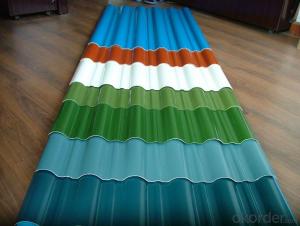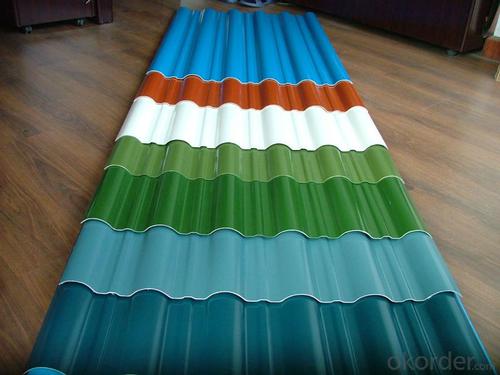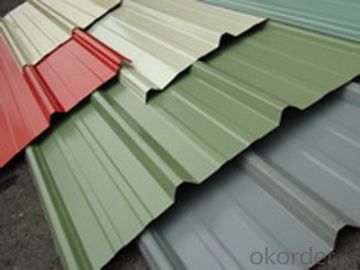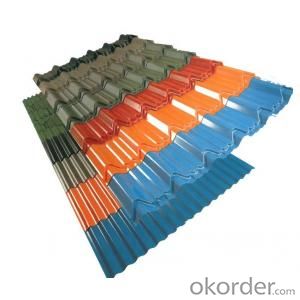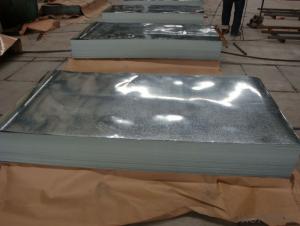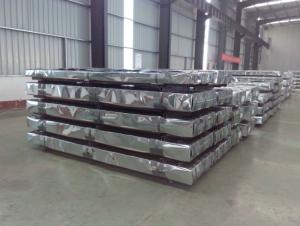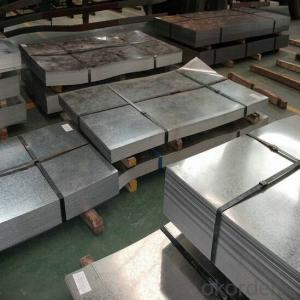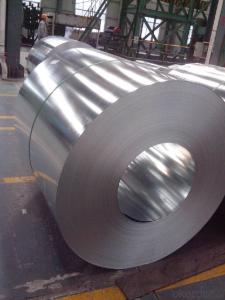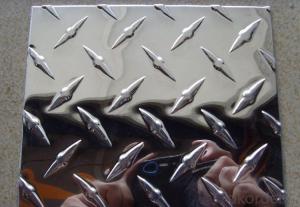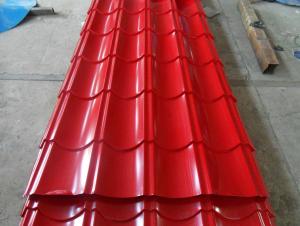Galvanized Steel Roofing Sheet for Construction
- Loading Port:
- Tianjin
- Payment Terms:
- TT or LC
- Min Order Qty:
- 300 m.t.
- Supply Capability:
- 1500 m.t./month
OKorder Service Pledge
OKorder Financial Service
You Might Also Like
Galvanized Steel Roofing Sheet for Construction
Description for Steel Roofing Sheet
PPGI Coil | Width | Thickness | Zinc Thickness | Face | Back |
600mm-1250mm | 0.12mm-0.8mm | 30-120g | 15-25u | 5-13u | |
Color | Raul color card , or your model color | ||||
Coil Weight | 3Ton--5Ton . | ||||
Packing | standard export packing . | ||||
Payment Terms | T/T, L/C ,Cash , West Union , Paypal | ||||
Trade Terms | FOB , CNF/CFR, CIF | ||||
Loading Port | Tianjin ,China | ||||
Delivery Time | 25days base on order quantity | ||||
Datas for Steel Roofing Sheet
Type: Steel Coil
Technique: Hot Rolled
Surface Treatment: Galvanized
Application: for building construction
Width: 600-1250mm
Length: by coil
ppgi width: 600mm-1250mm
ppgi thickness: 0.12mm-0.80mm
zinc coated: 30g-120g
ppgi face: 15-25u
ppgi back: 5-13u
ppgi color: ral serial
Advantages:
Rich experiences------------- more than 13 years experience in steel industry.
Golden Supplier-----factory recognized ISO certificates etc.
Professional sales team------International trade teams for your service .
7/24 service for you------------all questions will be deal with within 24 hours
FAQ:
Why Should You Choose Us:
Stable quality ----continous casting hot rolled production techenic, strictly quality control system.
Lower price -------Not the cheapest but the lowest price at the same quality .
Good service -----Satisfactory service within 24hours.
Delivery time ------15-25days for the mass production .
Discount---------------discount base on monthly large quantity purchase in long term.
Picture:
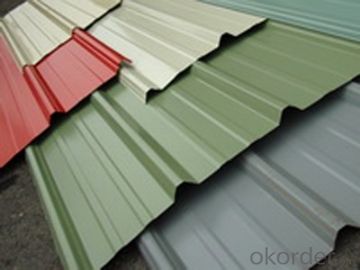
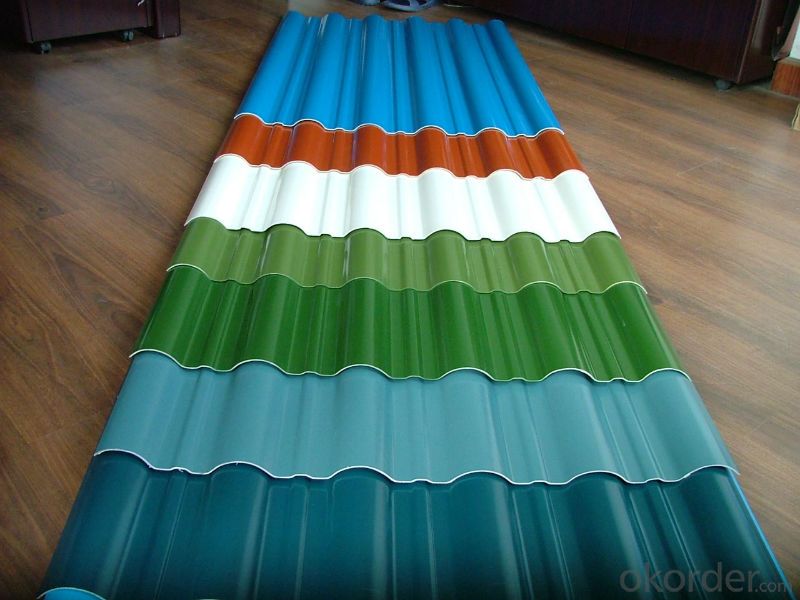
- Q: What is the difference between a painted and powder coated steel sheet?
- The application process and resulting finish distinguish painted steel sheets from powder coated steel sheets. Painted steel sheets are typically covered with a liquid paint, which can be applied through various methods such as spraying, brushing, or dipping. This liquid paint contains pigments and binders that stick to the steel surface and create a protective layer. It is possible to customize the paint in terms of color, gloss, and texture, allowing for a multitude of design options. However, painted surfaces may be susceptible to chipping, peeling, and fading over time, especially in harsh environments or with exposure to UV radiation. On the other hand, powder coated steel sheets are coated with a dry powder, which is electrostatically administered to the steel surface. The powder consists of a blend of finely ground particles, including pigments, resins, and additives. When applied, the steel sheet is heated, causing the powder particles to melt and fuse together, resulting in a sturdy and consistent coating. The outcome is a smooth, uniform finish that offers exceptional resistance to chipping, scratching, and UV radiation. Powder coating also provides a wider range of color choices and finishes compared to traditional liquid paint. In conclusion, although both painted and powder coated steel sheets offer protection and aesthetic appeal, powder coating provides superior durability, damage resistance, and a broader range of design possibilities.
- Q: How are steel sheets classified based on their surface finish?
- Steel sheets are classified based on their surface finish into categories such as hot rolled, cold rolled, and coated finishes.
- Q: How do steel sheets perform in corrosion resistance?
- Steel sheets generally have good corrosion resistance due to the protective oxide layer that forms on the surface, which helps to prevent rusting and deterioration. However, the level of corrosion resistance can vary depending on the type of steel and the specific environmental conditions it is exposed to.
- Q: What are the standard sizes of steel sheets?
- The standard sizes of steel sheets vary, but some common dimensions include 4x8 feet, 4x10 feet, and 5x10 feet.
- Q: Can steel sheets be used for solar panel installations?
- Solar panel installations can indeed utilize steel sheets. With their strength and durability, steel serves as a reliable foundation for mounting solar panels. Notably, steel sheets are frequently employed in the construction of support structures like mounting frames or racks for solar panels. Their malleability allows for easy shaping and cutting to meet installation requirements. Moreover, steel's resistance to corrosion is essential for prolonged outdoor usage. Nonetheless, it is vital to ensure appropriate insulation and grounding to avert potential electrical problems associated with employing steel sheets for solar panel installations.
- Q: Can steel sheets be used for electrical switchgear?
- Yes, steel sheets can be used for electrical switchgear. Steel is a common material choice for switchgear enclosures due to its durability, strength, and ability to provide protection from environmental factors such as moisture, dust, and temperature fluctuations. Steel sheets are commonly used in the construction of switchgear cabinets and enclosures to provide a robust and secure housing for electrical components. The steel sheets used for switchgear are typically coated or painted to provide additional protection against corrosion. Additionally, steel is a good conductor of heat, which helps dissipate any heat generated by the electrical components within the switchgear. Overall, steel sheets are a suitable material for electrical switchgear enclosures due to their mechanical properties, protective capabilities, and thermal conductivity.
- Q: Can steel sheets be rolled into cylinders or tubes?
- Yes, steel sheets can be rolled into cylinders or tubes through a process called tube or cylinder rolling.
- Q: What's the corrosion resistance of hot-dip galvanized steel sheet?
- Hot galvanized steel sheet is currently at 7200-7500 yuan per ton304 stainless steel plates are currently at $28000-30000 per ton
- Q: Can steel sheets be used for soundproofing or insulation?
- While steel sheets can indeed be utilized for soundproofing or insulation, they do not possess the same level of efficacy as materials specifically engineered for these functions. The density and sound- and heat-blocking capabilities inherent in steel sheets do confer some natural soundproofing and insulating properties to a certain extent. Nevertheless, their efficiency pales in comparison to those of dedicated soundproofing materials like acoustic panels or fiberglass insulation. To enhance the soundproofing or insulation attributes of a structure, steel sheets can be employed as an additional layer, but for optimal outcomes, they should be combined with other materials.
- Q: Are steel sheets resistant to impact and abrasion?
- Yes, steel sheets are generally resistant to both impact and abrasion due to their high strength and durability.
Send your message to us
Galvanized Steel Roofing Sheet for Construction
- Loading Port:
- Tianjin
- Payment Terms:
- TT or LC
- Min Order Qty:
- 300 m.t.
- Supply Capability:
- 1500 m.t./month
OKorder Service Pledge
OKorder Financial Service
Similar products
Hot products
Hot Searches
Related keywords
